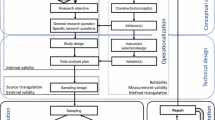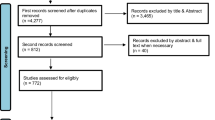Abstract
This paper proposes a study of the various ways in which social and ethical issues are integrated in the curricula of nanoscience and nanotechnology master degrees. During the last decade, new types of courses have appeared in science and technology universities, first in the United States and now reaching Europe and France, associating a call for interdisciplinarity with a strong convergence of science and industry and new ways of integrating social and/or human sciences in scientific curricula. These courses entitled “science and society”, meant for science students, lean on (and participate in the construction of) specific ways of describing science, technology, and the social world, generally saturated with political values. The integration of these courses in science education, linked with a strong effort to specify new institutional organizations of scientific practice and education (in particular through political support of emerging fields like nanoscience, synthetic biology, or the cognitive sciences), may play an important role in the acculturation of future scientists and engineers to “good” scientific practices and discourses. The case of nanoscience and nanotechnology is particularly revealing of the changes which are now taking place in some universities. This paper will strive to identify different types of courses called “nano and society”, taking examples from both French and American contexts, and linking them to more or less implicit socio-epistemic and political values.
Similar content being viewed by others
Notes
http://www.lincolncenter.asu.edu/students_MADegree#ethics (no longer open access).
References
Abbott, A. (2005). Linked ecologies. States and universities as environments for profession. Sociological Theory, 23, 245–274. doi:10.1111/j.0735-2751.2005.00253.x.
Agar, N. (2007). Whereto transhumanism? The literature reaches a critical mass. Hastings Center Report, 37, 12–17. doi:10.1353/hcr.2007.0034.
Albe, V. (2009). Enseigner des controverses. Rennes: Presses Universitaires de Rennes.
Alpe, Y. (2006). Quelle est la légitimité des savoirs scolaires?. In A. Legardez & L. Simonneaux (Eds.), L’Ecole à l’épreuve de l’actualité. Enseigner les questions vives (pp. 233–246). Paris: ESF.
Astolfi, J.-P. (2006). Les questions vives en question? In A. Legardez & L. Simonneaux (Eds.), L’Ecole à l’épreuve de l’actualité. Enseigner les questions vives (pp. 9–12). Paris: ESF.
Aydeniz, M., & Hodge, L. L. (2011). Is it dichotomy or tension: I am a scientist. No, wait! I am a teacher! Cultural Studies of Science Education, 6, 165–179. doi:10.1007/s11422-009-9246-x.
Barakat, N., & Jiao, H. (2010). Proposed strategies for teaching ethics of nanotechnology. Nanoethics, 4, 221–228. doi:10.1007/s11569-010-0100-0.
Brickhouse, N. (2001). Embodying science: A feminist perspective on learning. Journal of Research in Science Teaching, 38, 282–295. doi:10.1002/1098-2736(200103)38:3<282:AID-TEA1006>3.0.CO;2-0.
Brint, S. (2005). Creating the future: ‘New directions’ in American research universities. Minerva, 43, 23–50. doi:10.1007/s11024-004-6620-4.
Bruun, H. H., & Whimster, S. (Eds.). (2012). Max Weber, collected methodological writings. Oxon: Routledge.
Callon, M. (1998). Des différentes formes de démocratie technique. Annales des Mines, 9, 63–73.
Carr, W., & Kemmis, S. (1985). Becoming critical: Education, knowledge and action research. Brighton: Falmer Press.
Commission of the European communities. (2008). Commission recommendation of 7 February 2008 on a code of conduct for responsible nanosciences and nanotechnologies research. Journal of the European Union, C, 424, L 116/46-52.
Conefrey, T. (1999). Sexual discrimination and women’s retention rates in science and engineering programs. Feminist Teacher, 13, 170–192.
David, K., & Thomson, P. (Eds.). (2008). What can nanotechnology learn from biotechnology? Social and ethical lessons for nanoscience from the debate over Agrifood biotechnology and GMO’s. Academic Press Inc., Elsevier.
Ferrer, C., & Allard, R. (2002). La pédagogie de la conscientisation et de l’engagement: Pour une éducation à la citoyenneté démocratique. Éducation et Francophonie, 30, Québec: ACELF.
Feynman, R. (1960). There is plenty of room at the bottom. Engineering & Science, 23, 22–36.
Fuller, S. (1999). The governance of science: Ideology and the future of the open society. Buckingham & Philadelphia: Open University Press.
Giroux, H. A. (1992). Border crossings: Cultural workers and the politics of education. New York & London: Routledge.
Gould, S. J. (1999). Rocks of ages: Science and religion in the fullness of life. New York: Ballantine Publications.
Hayhoe, R. (2007). The use of ideal types in comparative education: A personal reflexion. Comparative Education, 43, 189–205. doi:10.1080/03050060701362342.
Heldrich Center’s Education Report. (2009). A profile of nanotechnology degree programs in the United States, CNS-ASU.
Herman, C. (2005). New UAlbany Nano + MBA Program to produce “Industry-Ready” leaders. University at Albany, State University of New York. http://www.albany.edu/news/releases/2005/oct2005/nano_mba.shtml.
Hingant, B., Chevrier, J. & Albe, V. (2012). Développement d’une séquence pédagogique sur les nanotechnologies documentée par une analyse des controverses. In V. Albe, & E. Pedretti (Eds.), Special issue on Socio-scientific issues and controversy in science and technology education. Canadian Journal of Science, Mathematics and Technology Education (to be published 2014).
Holley, K. (2009). The challenge of an interdisciplinary curriculum: A cultural analysis of a doctoral-degree program in neuroscience. Higher Education, 58, 241–255. doi:10.1007/s10734-008-9193-6.
Jasanoff, S. (1990). Science at the bar. Cambridge, Mass.: MIT Press.
Jasanoff, S. (1993). The fifth branch. Science advisers as policy-makers. Cambridge, Mass.: Harvard University Press.
Kaiserfeld, T. (2013). Why new organizations are formed: Historical perspectives on epistemic and academic drift. Minerva, 51, 171–194. doi:10.1007/s11024-013-9226-x.
Kelly, G., & Crawford, T. (1997). An ethnographic investigation of the discourse processes of school science. Science Education, 81, 533–559. doi:10.1002/(SICI)1098-237X(199709)81:5<533::AID-SCE3>3.0.CO;2-B.
Kelty, C., & Hutchinson, J. S. (2007). Nanotechnology: Content and context, Rice University, Retrieved December 02, 2013, from http://cnx.org/content/col10418/1.1/.
Latour, B. (2005). Reassembling the social. An introduction to actor-network-theory. Oxford: Oxford University Press.
Laurent, B. (2010). Les politiques des nanotechnologies. Pour un traitement démocratique d’une science émergente. Paris: Mayer (Charles Léopold)/ECLM.
Lemley, M. A. (2005). Patenting nanotechnology. Stanford Law Review, 58, 601–630.
Maestrutti, M. (2011). Imaginaires des nanotechnologies. Mythes et fictions de l’infiniment petit. Paris: Vuibert.
Millar, R., & Osborne, J. (1998). Beyond 2000: Science education for the future. London: London School of Education, King’s College London.
Mody, C., & Kaiser, D. (2008). Scientific training and the creation of scientific knowledge. In E. Hackett, O. Amsterdamska, M. Lynch, & J. Wajcman (Eds.), The handbook of science and technology studies (3e ed., pp. 377–402). Cambridge: MIT Press.
National science and technology council, committee on technology, subcommittee on nanoscale science, engineering and technology. (2000). National Nanotechnology Initiative (NNI). The initiative and its implementation plan.
Professional Science Master’s Program (2007). Professional Science Master’s Program: An unconventional career track. Rice University, Wiess School of Natural Sciences. http://profms.rice.edu/nanophysics.aspx?id=206.
Roco, M., & W. Bainbridge (Eds.). (2001). Societal implications of nanoscience and nanotechnology. Arlington (Virginia): NSET Workshop Report. doi 10.1007/978-94-017-3012-9.
Roco, M. (2001b). International strategy for nanotechnology research and development. Journal of Nanoparticle Research, 3, 353–360. doi:10.1023/A:1013248621015.
Sadler, T. (2009). Situated learning in science education: socio-scientific issues as contexts for practice. Studies in Science Education, 45, 1–42. doi:10.1080/03057260802681839.
Schiele, B. (2008). On and about the deficit model in an age of free flow. In D. Cheng et al. (Eds.), Communicating science in social contexts. New models, new practices (pp. 93–118). New York: Springer.
Shapira, P., Youtie, J., & Porter, A. L. (2010). The emergence of social science research on nanotechnology. Scientometrics, 85, 595–611. doi:10.1007/s11192-010-0204-x.
Sheetz, T., Vidal, J., Pearson, T. D., & Lozano, K. (2005). Nanotechnology: Awareness and societal concerns. Technology in Society, 27, 329–345. doi:10.1016/j.techsoc.2005.04.010.
Slaughter, S., & Leslie, L. (1997). Academic capitalism: Politics, policies, and the entrepreneurial university. Baltimore: Johns Hopkins University Press.
Smith, B. L. R. (1992). The advisers. Scientists in the policy process. Washington: The Brookings Institution.
Star, S. L. (Ed.). (1995). Ecologies of knowledge. Work and politics in science and technology. Albany: SUNY Press.
Stengers, I. (2006). La vierge et le neutrino. Les scientifiques dans la tourmente. Paris: Les empêcheurs de penser en rond.
Toumey, C. (2005). Apostolic succession. Does nanotechnology descend from Richard Feynman’s 1959 talk? Engineering & Science, 1/2, 16–23.
Tuomi, I. (2002). The lives and the death of Moore’s law. First Monday, February 2002, Retrieved December 02, 2013, from http://www.meaningprocessing.com/personalPages/tuomi/moreinfo.html.
Ylijoki, O.-H. (2000). Disciplinary cultures and the moral order of studying: A case-study of four Finnish university departments. Higher Education, 39, 339–362. doi:10.1023/A:1003920230873.
Ylijoki, O.-H. (2003). Entangled in academic capitalism? A case-study on changing ideals and practices of university research. Higher Education, 45, 307–335. doi:10.1023/A:1022667923715.
Acknowledgments
This research has been financed by a grant from the C’Nano Ile-de-France. We would like to thank Nicolas Baya-Laffite, Philippe Fontaine, Sebastian Grevsmühl, Brice Laurent for their hints and helpful comments.
Author information
Authors and Affiliations
Corresponding author
Additional information
Lead Editor: L. Carter.
Rights and permissions
About this article
Cite this article
Fages, V., Albe, V. Social issues in nanoscience and nanotechnology master’s degrees: the socio-political stakes of curricular choices. Cult Stud of Sci Educ 10, 419–435 (2015). https://doi.org/10.1007/s11422-014-9593-0
Received:
Accepted:
Published:
Issue Date:
DOI: https://doi.org/10.1007/s11422-014-9593-0




